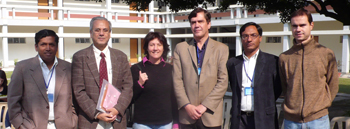International Research Collaboration Key to Tackling Global Health Issues
Professor Madou and MAE students travel the globe to advance research in Bio-MEMS
Marc Madou, Ph.D., chancellor's professor of mechanical and aerospace engineering, is already quite the world traveler; now he can add a meeting with ’s prime minister and a seventh visit to to his overseas journeys.
 Madou embarked upon a five-week travel spree last winter to visit his UC Irvine students participating in the National Science Foundation’s Indo-U.S. Program at the Indian Institutes of Technology in Kanpur and Kharagpur, give 12 invited lectures at seven universities and five conferences, and meet with prominent government officials in both India and Malaysia to discuss his research and technology in bio-micro-electro-mechanical system (Bio-MEMS) advancements being developed at UC Irvine.
Madou embarked upon a five-week travel spree last winter to visit his UC Irvine students participating in the National Science Foundation’s Indo-U.S. Program at the Indian Institutes of Technology in Kanpur and Kharagpur, give 12 invited lectures at seven universities and five conferences, and meet with prominent government officials in both India and Malaysia to discuss his research and technology in bio-micro-electro-mechanical system (Bio-MEMS) advancements being developed at UC Irvine.
Involved in numerous international multidisciplinary projects, Madou began his trip with a stop in as a plenary speaker on Bio-MEMS at the 3rd Kuala Lumpur International Conference on Biomedical Engineering 2006. While visiting, Madou met with Prime Minister Abdullah Ahmad Badawi and other government ministers to discuss collaboration opportunities with UC Irvine in combating dengue fever and diabetes.
Part of Madou’s research focuses on compact disc microfluidic platforms - a promising approach for the integration of multiple functions on the same substrate. These platforms can be used in the development of a fast, efficient test for dengue fever in the field, rather than waiting for lengthy laboratory testing.
Lab results could be returned in as little as 20 minutes, instead of waiting the typical four to five hours as currently in practice. This is possible due to the miniaturization of the components on the disc, the optimized operation fluidics at small-length scales, and fast DNA amplification, all integrated together on the same platform. In addition to being faster and smaller, these advances could make such tests less expensive and enable their use in the field rather than in specialized laboratories.
Another international collaboration conducted by Madou and his team involves the creation of a “smart pill,” designed for the responsive delivery of insulin in diabetic patients. This drug delivery system would supply insulin according to the specific needs of the patient, as measured by a sensor in the patient’s body. In place of daily insulin doses, a diabetic individual would undergo a minimally-invasive procedure every one to three months to insert the delivery system under the skin.
While overseas, Madou, who is an honorary distinguished professor at IIT Kanpur, also traveled to to visit two of his students participating in the NSF Indo-U.S. Program; Genis Turon, a third-year Ph.D. student in mechanical and aerospace engineering and Ruth Lambert, a fifth-year mechanical and aerospace engineering Ph.D. student.
Designed to encourage interdisciplinary research between and Indian scientists, the Indo-U.S. Program was initiated in 1997 and cooperating agencies include the Department of Science and Technology (DST) in and the NSF in the Both support workshops and joint research projects in fundamental areas of science and technology.
Turon spent three months at the Indian Institute of Technology,
Faster reaction rates could mean a doctor and patient will have DNA test results back faster. The collaboration supports numerical and experimental work on mechanical actuators - devices used to apply a force, push and pull, or move to a position and hold by mechanically converting rotary motion into linear motion, in Madou’s BioMems research group.
Madou’s grant of $140,000 over three years from the NSF/DST began two years ago, and four students have traveled as part of the program; two students from UC Irvine and two that have traveled to the
Madou plans to continue sending students to to advance their research projects in both countries, and promote the spirit of global interdisciplinary work. Students will be chosen based on academic performance, the quality of their research, the overlap of their work with the collaborating groups in , and their potential for adaptability in a new society.
“An understanding of Asian cultures, and exchanges in science and technology, are important to future innovation and commerce because of the implications of large markets and populations in
